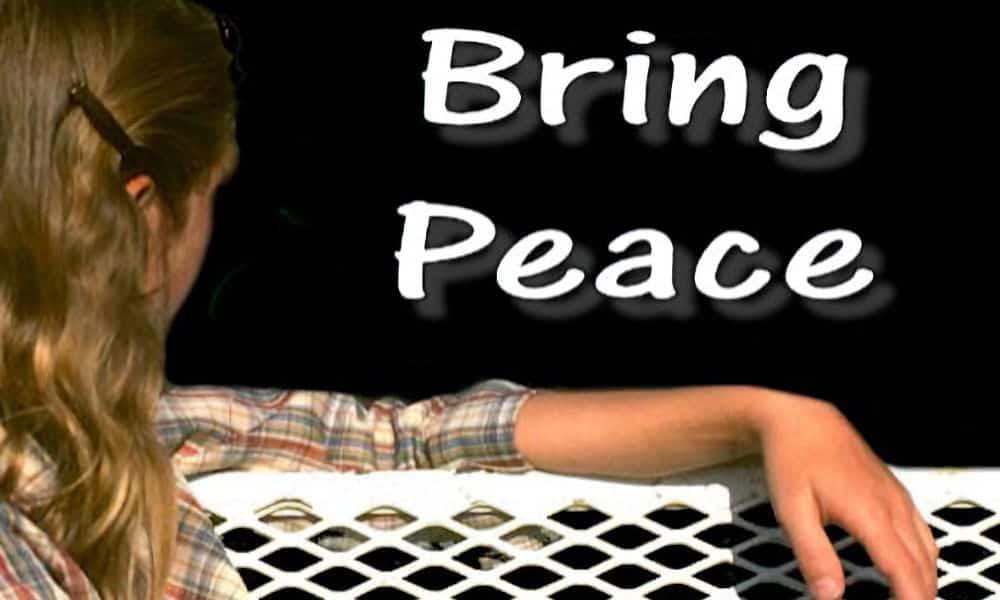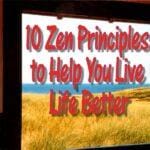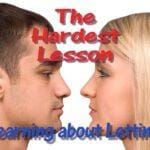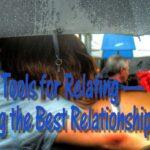Bring peace‑a way to find yourself in a grounded and whole manner. It means giving up being right, among other things.
Back in 1986, Darbella and I went on the grand European Holiday. We ended up spending a good deal of time in Scotland, touring about, losing golf balls on difficult courses, and visiting famous sites.

Psst!! Hey!!!
** Want more great writing designed to help YOU to shift your behaviour?
** Want to learn how to find, build or deepen your principal relationship?
** Want to know more about Zen living and being?
Check out Wayne’s books! (amazon link)
Or, check them out right on our site.
One of the more interesting side trips was up to the north of Scotland, to the Findhorn Community. Odd place. You drive along one road, and there is a railroad crossing. The arms came down, we stopped, and we were amazed to see a Harrier jet cross in front of us. Seems the Royal Air Force has a base up there, and the landing path crosses the road. Glad we stopped.
Findhorn was one of those 60s places where a bunch of hippies settled, and in their words, communed with the earth spirits. Soon, their gardens overflowed with huge cabbages and other crops, this on land that was mostly sand. They’ve been teaching courses and holding retreats ever since.
A Course in Miracles and a New Approach
None, of this really has any relevance to our topic, other than that the title of this piece is a paraphrase of one of the key points in a book, A Course in Miracles (ACIM). I found the book in the Findhorn Bookstore.
Thus, Findhorn really has nothing to do with the rest of the story, other than to provide a good intro.
Anyway, I would have to say that ACIM was the book that first opened my eyes to another way of looking at what we call reality. Supposedly channeled to an atheist from Christ, the book presents a view of how the world works that became the basis for many of my later understandings.

Nothing in the rather large book is radically new, and there are some points I disagree with.
For example, the book states that if one thinks something is evil, one simply misunderstands the situation. The book has nothing to say regarding the Holocaust, which, it seems to me, was not a misunderstanding, but rather evil incarnate.
I’ve never been one to throw the baby out with the bath water, and I found that ¾ of the book made perfect sense.
ACIM makes it clear that all emotional distress is self-created, as opposed to other-created.
You might say that the message is: “if you don’t like the way something is, change your view of the situation.”
Which pretty much matches our understanding of things. To go back to the Holocaust, we see this principle in operation.
The situation was horrific, and yet Victor Frankl wrote Man’s Search for Meaning in Auschwitz. He took a universally horrible situation and (forgive the pun) made it meaningful. The situation does not ever dictate the result for the individual confronting it. Anything can come from anything.
The Goal of Bringing Peace
Similarly, our present idea (taken from ACIM) is that there is always the opportunity to bring peace to any situation. Situations are as they are, at what might be described as the objective, or ‘data’ level. What is happening is what is happening.
The place where things go ‘south’ as at the subjective level of interpretation.
Of course, we want to believe that events have intrinsic meanings–that these meanings are obvious–and that the meaning I ascribe to a situation is also the ‘true meaning.’ We get right indignant when others disagree with us as to this subjective meaning.

All of us have been caught up in the drama of trying to get others to change their minds and/or their meanings. We get so caught up in defensiveness and argument that we forget that the subjective is, by definition, also the personal.
How I view my reality is solely and completely a result of my upbringing, experiences, and history.
The only authentic question is—is the way I am interpreting my reality helping or hurting me? If my interpretation is hurt-filled, I can continue to try to force the world to see it my way, or I can bring peace.
To bring peace is not giving up, surrendering, admitting fault, or wimping out.
Let me toss out a few names: Gandhi, Martin Luther King, Mother Theresa. Not exactly wimps. People with strong opinions, goals, aims. Yet, their method was similar.
Into extraordinarily difficult situations, they brought peace. Not compromise. Just a firm conviction that one could be peaceful while at the same time changing the course of history.
Our personal lives are precisely as torment-filled as we torment ourselves.
In Steven King’s Lisey’s Story, a character says something like: “90% of the things people think about are none of their smucking business.” The point is that we spend inordinate time in our heads making trouble for ourselves over things we can either do nothing about, or which are not our business in the first place.
Peace, on the other hand, begins with allowing situations to be situations, and allowing others to hold their beliefs without the demand that they change.
Rather, I simply engage in what I can control—my interpretations, and especially my actions.
It does me no good to demand that others communicate elegantly and truthfully. All I can do is to communicate elegantly and truthfully. It does me no good to preach non-violence, and then yell at others, or, heaven forbid, use physical force unnecessarily.
I remember once walking through a mall. A mother was shaking her eight-year-old, screaming at him, “How many times have I told you not to yell at and hit your sister?” I can’t for the life of me, figure out where he learned to do that…
Excuses, Excuses…
Many are the excuses.
“I was abused as a child.”
“I speak directly and honestly. I only lose it when he’s being a jerk.”
“My dad had a bad temper.”
“I can’t let people walk all over me.”
Instead of excuses, bring peace. Speak clearly and act in a disciplined way. Tell your truth without demanding that others agree with you. Act so that your words match with your actions, and move forward so that you sense your own integrity.
This is not backing down. This is claiming your story, your truth, and your path as your own, and simply and peacefully walking it.
Notice how you block yourself from walking your own peaceful, impactful path—by blaming, fighting, demanding. Open yourself to the possibility of living your life free of the need to force others, manipulate others, or seek the permission of others. Find and walk your path, in peace and with integrity. In the end, it is all any of us can do.





